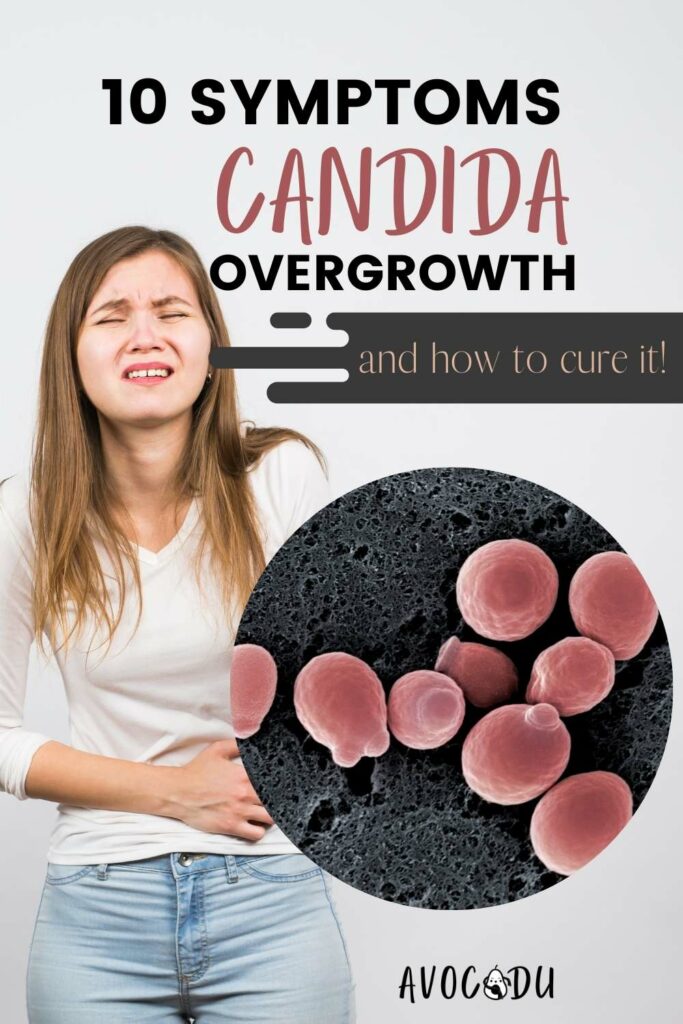10 Candida Overgrowth Symptoms + 3 Steps to Naturally Cure It!
Candida can cause all sorts of problems in the body, and the worst part is that most people don’t even know they have it.
This post may contain affiliate links, which helps keep this content free. Please read our disclosure for more info.
What is candida?
Candida is a type of fungus, which is a form of yeast, that can be found in the mouth and intestinal tract. It helps with nutrient absorption and digestion.
The problems occur when candida is overproduced. When the immune system is compromised, the healthy balance of candida in the body can be disrupted and cause a yeast infection.
This can be caused by a variety of factors.
Taking antibiotics can kill too much of the healthy bacteria in the body and cause it. The overconsumption of alcohol, sugar, refined carbohydrates, and fermented foods are also common factors that can lead to an overgrowth of candida.
The overgrowth of candida can wreak havoc in the body and can result in a variety of health problems.

What are Candida Overgrowth Symptoms?
The symptoms below will help you determine if you have candida, and then we will get into how to cure it!
1. Oral Thrush
We will start out with one of the most common candida overgrowth symptoms and the easiest to detect. According to the Mayo Clinic, oral thrush is a condition in which the fungus Candida albicans accumulates on the lining of your mouth
The symptoms of oral thrush include:
- White coating on the tongue, cheeks, and tonsils
- White, raised lesions on the tongue or around the mouth
- Bad breath
- Redness or soreness in the mouth
- Loss of taste
- Bleeding or cracking in the mouth
If you have one or more of these symptoms, you likely have candida.
2. Fungal Infections of the Skin and Nails
Candida can cause vaginal yeast infections as well as Athlete’s Foot and fungus in the toenails. If these infections occur often, especially after treatment, you might have candida.
3. Chronic Fatigue
This one may be a little harder to pinpoint because chronic fatigue can be caused by a variety of factors, not just candida. An imbalance in the immune system and digestive system, which are both candida overgrowth symptoms, can also cause chronic fatigue.
If you suffer from chronic fatigue or exhaustion despite getting enough rest every night, it may be a sign that you have candida.
4. Chronic Sinus Infections and Other Allergy Symptoms

Candida can cause sinus and allergy-related symptoms, including post-nasal drip, fever, cough, bad breath, headaches, sinus pressure, and congestion.
This can also be harder to detect if you are someone who already suffers often from problems related to allergies and sinuses. Read the other symptoms carefully to determine if you suffer from other symptoms as well. That will help you pinpoint whether candida is the underlying problem or not.
5. Strong Cravings for Sugar
When the immune system and digestive system are compromised, you will likely suffer from nutritional deficiencies, because the body can’t properly process food and absorb nutrients.
These imbalances can cause severe cravings for sugar. This makes the situation even worse because sugar aids in candida growth and exacerbates the problem.
6. Difficulty Concentrating or Focusing (Brain Fog)
Candida can cause all sorts of mental problems that usually all fall under the category of “brain fog.” The common symptoms include difficulty concentrating, lack of focus, poor coordination, memory loss, and even mood swings.
These symptoms can also occur as a result of severe stress, so make sure to try to identify one or more of the other symptoms on the list as well.
7. Hormone Imbalance
Candida can actually produce a substance that can mimic estrogen. A hormonal imbalance can cause a decreased sex drive, early menopause, PMS, migraines, bloating, and weight gain.
These are also common symptoms that women suffer from their periods, so listen to your body and see if you can detect any symptoms that are worse than your normal monthly cycle.
8. Weak Immune System

As stated earlier, candida overgrowth can occur when the immune system is compromised. This imbalance can cause the immune system to stay in a weakened state until the candida is cured.
A weakened immune system can also cause many of the other symptoms on this list. If you find yourself feeling weak, sick, and fatigued often, it may be a sign that you have candida.
9. Digestive Problems
An overgrowth of candida kills off the healthy bacteria living inside of the digestive system. The healthy bacteria can no longer process food efficiently and effectively, and infections, ulcers, and other problems can occur.
This can cause other digestive related issues such as constipation, diarrhea, flatulence, bloating, cramping, and other stomach issues.
10. Urinary Tract Infection
While this symptom is much more uncommon, it is still worth mentioning. Candida can cause urinary tract infections and other vaginal infections and issues in women.
If you are suffering from these types of problems and they persist, you may have candida.
So how about some good news!?
How do I get rid of Candida overgrowth?
There is a cure! There are a few actually.
With the right steps, you can cure yourself of these awful symptoms and treat candida overgrowth in the body.
1. Eliminate sugar.
Sugar feeds candida growth and should be avoided at all costs. This includes the sugar in fruits.
Nix the processed foods, carbohydrates, and sugars, and opt for some green vegetables instead!
We have a whole article on the foods that kill candida. These foods include non-starchy vegetables such as broccoli, asparagus, cauliflower, leafy greens, and others.

2. Get the healthy bacteria into your gut again.
As stated above, candida kills off the healthy bacteria living in your gut that helps you process and absorb nutrients. As candida is killed off, it’s important to bring back the balance of healthy bacteria in the gut.
This can be done by taking a good probiotic, eating Greek yogurt, and by supplementing with apple cider vinegar in the diet.
Taking a good probiotic is the first place to start!
No matter what supplement you use, you want to take AT LEAST 50 billion units of probiotics daily from a minimum of 10 different sources for best results.
While you don’t need to purchase only refrigerated probiotics, make sure the packaging is well sealed. It’s also essential that the packaging is dark (or opaque, not transparent) to protect from light damage.
We have our own brand of Probiotics here at Avocadu called Gut-13.
PROBIOTIC

Avocadu’s Gut-13 Probiotics
In a recent study, women taking probiotics lost 50% more weight than those who did not. Your gut health and how well you absorb nutrients MATTERS. Don’t miss out on getting in a daily probiotic. Click here.
Our specially formulated probiotic supplement contains:
- Over 100 Million CFU’s Per Serving
- 13 Different Gut Healing Strains
- Delayed-Release for Deeper Support
- Made in the USA
Probiotics are one of the best solutions for healing your gut, helping you lose weight faster, and providing you with a healthy source of gut flora every day!
3. Improve the health of gut with natural remedies and supplements.
This can be done by taking other natural spices and oils as supplements in the diet. Anti-inflammatory spices such as ginger, turmeric, and cinnamon can be easily added to teas and meals.
Organic, unrefined coconut oil should also be added to the diet because the caprylic acid in the oil directly fights candida and restores stomach acidity to normal levels.
Make sure to avoid all processed foods as well as common allergen causing foods such as dairy and wheat. These foods contain harmful ingredients that can make candida worse. Sugar and alcohol should also be avoided at ALL costs.
What does Candida in stool look like?
Candida in stool can look like a white, stringy substance that is similar to cottage cheese. It can also appear as white patches or plaques on top of stool.
If you think you may have candida, it’s important to see a doctor or naturopathic practitioner so they can confirm whether or not you actually have an overgrowth. They can also help you create a treatment plan to get rid of candida for good!
Candida overgrowth is a serious problem that should not be ignored. If you are experiencing any of the symptoms listed above, it’s important to take action and get rid of candida for good!
How can I test for Candida at home?
There are a few different ways that you can test for candida at home. The most common way is to use a candida test kit that can be purchased online or at your local health food store.
Another way to test for candida is to do a candida cleanse and see if your symptoms improve. If they do, it’s likely that you have an overgrowth of candida.
Finally, you can also ask your doctor to test for candida. They can do a simple blood test or stool test to confirm whether or not you have an overgrowth.
What happens if Candida is left untreated?
If candida is left untreated, it can cause a number of problems. First, it can lead to leaky gut syndrome, which is when the lining of the intestines becomes damaged and allows toxins and bacteria to pass through into the bloodstream.
Leaky gut syndrome can cause a wide range of other problems such as food allergies, inflammation, and even autoimmune diseases.
Second, candida can also cause fatigue, brain fog, and a general feeling of unwellness. This is because candida releases toxins into the bloodstream that can cause these symptoms.
Finally, if candida is left untreated, it can lead to more serious problems such as urinary tract infections, joint pain, skin rashes, and even thrush. Thrush is a yeast infection of the mouth that can cause white patches on the tongue and throat.
How long does it take for Candida overgrowth to go away?
The time it takes for candida overgrowth to go away will vary from person to person. For some people, it may only take a few weeks, while for others it may take several months. It all depends on the severity of the overgrowth and how well you stick to your treatment plan.
Can Candida affect your liver?
Yes, candida overgrowth can affect your liver. When candida overgrowth occurs, it releases toxins into the bloodstream that can cause damage to the liver.
Does apple cider vinegar help with Candida overgrowth?
Yes, apple cider vinegar can help with candida overgrowth. The acids in the vinegar help to kill off candida and restore stomach acidity to normal levels. Apple cider vinegar can be taken as a supplement or added to food and drinks.
Still have questions about Candida? Feel free to drop a comment below and ask!

Great article
This is great info and not very hard to adhere to. One just have to be disciplined.